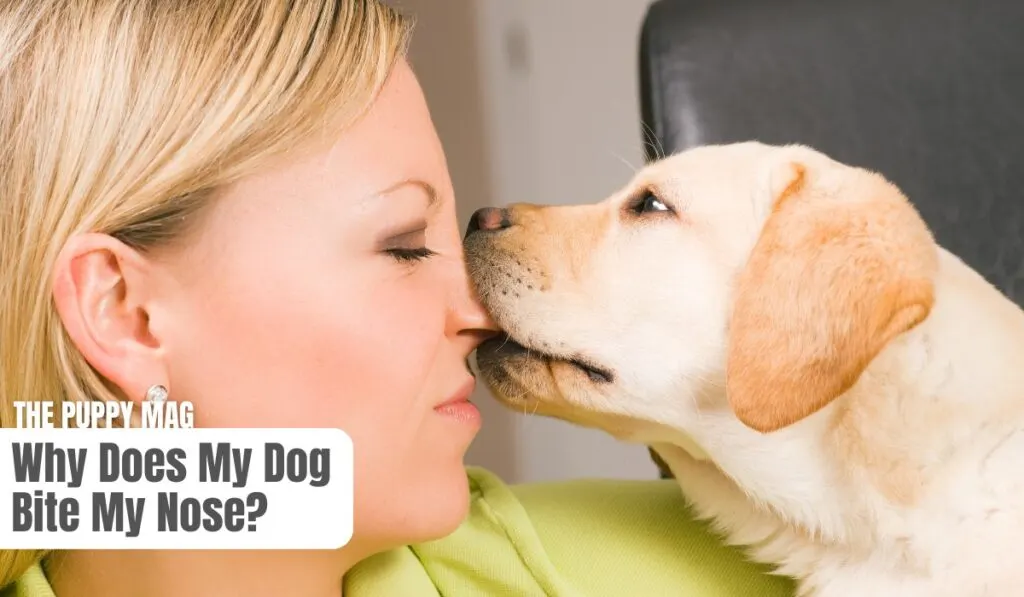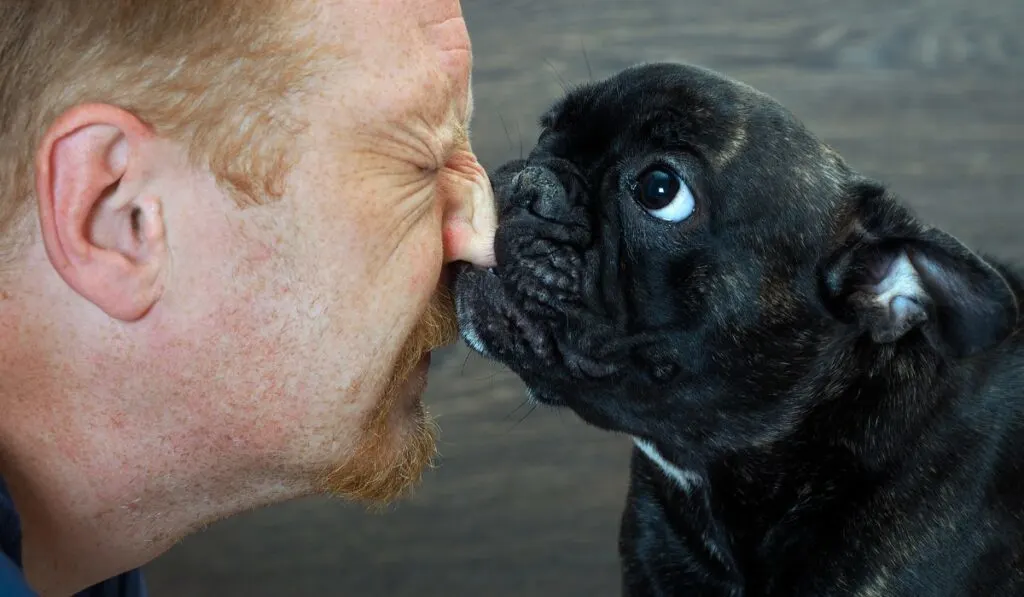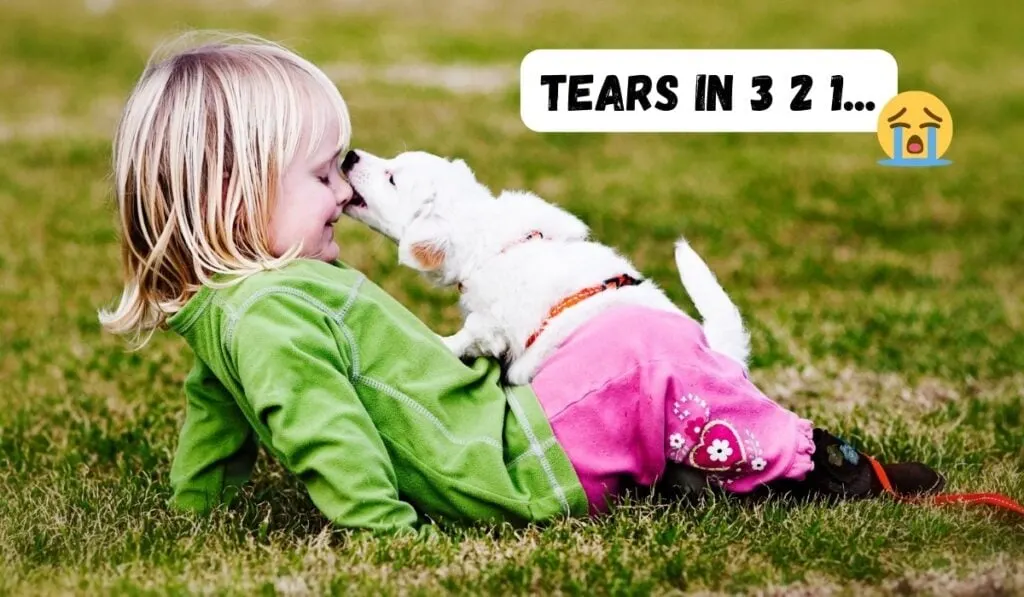If your dog is biting your nose, whether it be playtime nibbling or actual biting, you’ll want to know why and what you can do about it!
Not all circumstances of this are equal. If your dog is nibbling at your nose while you’re engaging in some playtime snuggling on the couch then this is completely different from your dog randomly lunging for your nose and truly snapping at it…
The reasons we discuss below will cover both of these situations and more.

Is It Normal For Dogs To Bite Our Noses?
Dogs have unique ways of communicating with us humans, and at times, it may involve nipping, licking, and yes, sometimes even biting our noses.
It’s actually not entirely uncommon for a dog to target a person’s nose specifically.
You see, dogs tend to express their feelings through physical actions and sounds, and biting can be one of these expressions.
However, it’s important to remember that while this behavior might be cute when a tiny puppy does it, it’s not something we want to encourage in a full-grown dog.
It might be considered ‘normal’ in the sense that it happens often, but that doesn’t mean it’s a behavior we should promote or let slide.
Moreover, while gentle mouthing can sometimes be tolerated, actual biting can cause harm and is not a behavior you should ignore.
➡️ Related: Why Does My Dog Only Bite ONE Owner (causes & solutions)
7 Reasons Why Your Dog Bites Your Nose
Let’s run through the seven most common reasons why your dog might be biting your nose.
Understanding which applies to you and your dog will depend on a few factors like your dog’s age, the situation at hand, how often it happens, and whether or not your dog is controllable at that given time.
1. Affection and Bonding
Dogs often use their mouths to show affection – not so different from humans offering a warm hug or a comforting hand squeeze. Your dog might gently nibble at your nose as a sign of love and bonding. This is particularly true during moments of relaxation and tranquility when your dog feels closest to you. They are trying to express their comfort and love in a language they best understand.
2. Communication
Dogs can’t express their needs or desires verbally, so they resort to physical actions. Biting your nose might be their way of conveying various messages, like hunger, needing to go outside, or craving playtime. They might have noticed that this action garners a reaction from you, encouraging them to use it as a communication tool. The key here is understanding what your dog is trying to communicate, which often requires attention to other signs like whining, pawing, or barking.
3. Exploring their Environment
Particularly for puppies, their mouth is a primary means of exploring their environment. Their sense of taste and touch is their equivalent of our hands, and they use their mouth to interact with objects, creatures, and people in their environment. When a puppy nibbles on your nose, they’re not only exploring but also learning about acceptable and non-acceptable behaviors.

4. Dominance or Control
In some situations, your dog might bite your nose as a way of asserting dominance or control. This behavior is often an outcome of feeling threatened or anxious. If their space is being invaded or they feel uncomfortable, a bite can be a clear sign to back off. Proper socialization and training from a young age can help minimize such responses.
5. Overstimulation or Excitement
Excessive excitement or overstimulation can lead to uncontrolled biting. Just as people might shout or jump around when they’re incredibly excited, dogs can express their joy or excitement physically, which can sometimes include biting. This is particularly common during playtime or when you return home after being away for some time.
6. Accidental Reinforcement
One of the major reasons why dogs continue to bite our noses is accidental reinforcement. This means that our reactions to their behavior might be encouraging them to do it more often. If your dog bites your nose and you respond with laughter, attention, or even just a reaction of any kind, they’ll see the bite as a successful means of getting what they want. This unintentional reinforcement of the behavior can make it a persistent habit. It’s vital to curb any reactions that could be interpreted as positive reinforcement if you want to stop this behavior.
7. Understimulation
Dogs are naturally active creatures that require regular mental and physical stimulation. When they don’t get enough of this, they can become bored and may resort to biting as a way to entertain themselves or burn off excess energy. Understimulated dogs often develop other destructive behaviors as well, such as chewing on furniture or excessive barking.
Should You Stop This Behavior?
While a puppy gently nibbling on your nose might seem cute and endearing, it’s essential to keep in mind that this behavior can evolve into a problem as your dog grows.
Even if the bite is gentle and not meant to harm, it can still be painful and alarming, particularly for children or visitors who aren’t expecting it.
So yes, you should aim to discourage your dog from biting your nose.
An example of why this behavior should be stopped >>

Furthermore, it’s crucial to remember that the nose is a sensitive part of our body. A dog bite, even a gentle one, can cause a nasty injury.
It’s better to encourage safer behaviors that allow your dog to communicate and express affection.
How to Redirect Your Dog’s Biting
Teaching your dog not to bite requires patience, consistency, and a calm approach. Here’s how you can redirect your dog’s biting:
1. Use Positive Reinforcement
Always reward good behavior. Whenever your dog behaves well, give them a treat, a toy, or some affectionate petting. This will encourage them to continue with the behavior that leads to rewards.
2. Teach Bite Inhibition
Bite inhibition is teaching your dog to use their mouth gently. If your dog bites your nose, you can make a loud, high-pitched “Ouch!” This sound can startle them and make them let go. If they respond correctly, reward them.
3. Provide Suitable Chew Toys
If your dog tends to bite when they’re bored or anxious, providing chew toys can help. This will give them an appropriate outlet for their chewing and biting instincts.
4. Train Them to Understand “No”
Train your dog to understand the word “no.” Use a firm but calm voice and repeat this word whenever your dog tries to bite your nose. Be consistent so they understand that “no” always means they have to stop what they’re doing.
5. Consult a Professional
If your dog’s biting becomes a significant problem, it may be time to consult with a professional dog trainer or a behaviorist. They can help identify the root cause of the behavior and create a tailored training program to correct it.
Remember, patience is key when it comes to training dogs. Don’t get discouraged if they don’t pick up on things right away. Consistency, patience, and love will go a long way in teaching your furry friend not to bite your nose.
